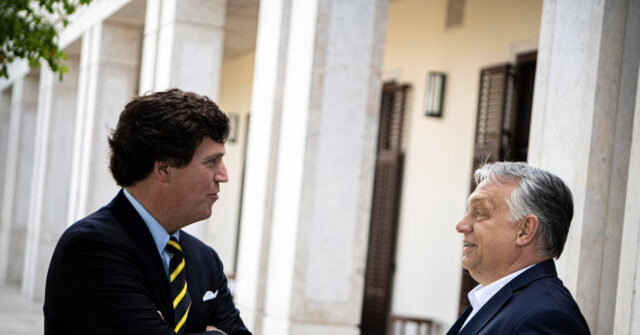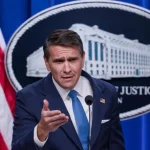

Hungary has vowed to block censorious attempts from globalist Eurocrats such as Guy Verhofstadt to impose sanctions on Tucker Carlson for interviewing Russia’s Vladimir Putin.
Amid the left-wing establishment furore over Carlson’s decision to interview the Russian head of state, former Belgian prime minister and current member of the European Parliament, Guy Verhofstadt called for an EU travel ban to be imposed on the American journalist and for the bloc to begin the process to levy sanctions External Action Service, the EU’s diplomatic controlled by Spanish socialist Josep Borrell.
However, the body does not have unilateral authority to sanction individuals but rather can merely present evidence to the European Council, the executive arm of the EU composed of the heads of state or government of the EU member states, any of whom has the power to veto a decision.
Therefore, socially conservative Hungary has the ability to block the EU from sanctioning Carlson and on Tuesday confirmed that it would do so if the measure was put before the Council.
Responding to a news story about the potential of EU sanctions on the American journalist, Balázs Orbán, the political director of Hungarian Prime Minister Viktor Orbán wrote on social media: “Don’t bother trying – we won’t let it happen!”
Don’t bother trying – we won’t let it happen!@TuckerCarlson💪 pic.twitter.com/P4wi1YkwuG
— Balázs Orbán (@BalazsOrban_HU) February 7, 2024
The instant shutdown from Budapest will likely further rile Verhofstadt, who has been at the forefront of calling for the elimination of veto power for EU member states over Hungary’s opposition to funding for the war in Ukraine.
The principle of unanimity and the enforcement mechanism of national veto powers, in a similar fashion to the allocation of senators or electoral college votes in the United States, was an essential component of the formation of the European Union as it guaranteed that smaller member states could not be entirely overpowered by larger nations such as France or Germany.
However, as the power of Brussels has grown, there has been a growing disdain for conservative countries such as Hungary and Poland defending their ideals and interests.
Verhofstadt is not alone in favouring the abolition of national veto power, with the bloc’s top diplomat, Foreign Affairs chief Josep Borrell, arguing in December that in light of the threat Russia poses to European democracy, it may be necessary to end unanimity for foreign policy decisions.
EU Politicians Threaten to Sanction Tucker Carlson for Interviewing Vladimir Putinhttps://t.co/MVWiqaheHs
— Breitbart London (@BreitbartLondon) February 7, 2024






